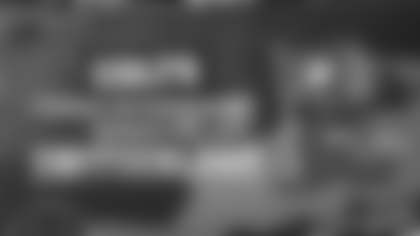Owners Approve Coach-to-Defensive Player Electronic
Signal-Calling
PALM BEACH, Fla. - Tony Dungy has some questions about the NFL's latest rules change.
And the Colts' head coach said the answers may dictate not only how he feels about the rule, but how the team approaches handling it.
The NFL owners on Tuesday adopted 2008 Resolution G-4, a resolution that will allow coaches to communicate with defensive players via an electronic in-helmet system in the same way coaches have communicated with quarterbacks since 1994.
The resolution was adopted during the 2008 NFL Owners Meetings, being held at The Breakers through Wednesday in Palm Beach.
"The big thing is for people to figure out who they want the helmet on," Dungy said Tuesday afternoon during a break at the meetings.
Since 1994, quarterbacks have worn helmets equipped with speakers enabling them to communicate with coaches. For the past several seasons, NFL owners have considered proposals to allow a similar device for defensive players.
On Tuesday, a proposal passed by a vote of 25-7 to allow a device in the helmet of one defensive player on the field at a time.
Should the player with the equipped helmet leave the game, another player can be designated to have the device. Only one defender with the device can be on the field.
Dungy said Colts middle linebacker and defensive captain Gary Brackett likely will wear the equipped helmet.
"My question is about the second one," Dungy said. "I don't have all the answers on that. I tried to find out today where these helmets are going to be and how quick you're going to have access to them. Your question is, 'Is it (the second player) going to be (safety) Bob Sanders?' If Gary has to go out, he's the next guy who's going to be in there all the time, but if it's going to take two or three plays to get the second helmet for Bob Sanders, then maybe the second one should go on Gary Brackett's backup so if he's out, this guy's going right in and it's a seamless transition.
"If we can have the helmet right there and the equipment man can just hold it and get it Bob Sanders . . . but if it's locked up in some type of security deal where it might take two or three plays to get it, it's a different story."
Dungy also said he doubts the new rule will eliminate completely the practice of signaling in defensive plays from the sideline. Under NFL rules, radio communication to players on the field must stop when the play clock reaches 15 seconds. Dungy said offenses likely will delay making substitutions at times until just before that mark, meaning defensive coordinators will then likely use signals to adapt to offensive personnel.
"It will level the playing field, but it's not going to be the just end of all the problems that I think some people anticipate," Dungy said. "On offense, you kind of control everything. I can see teams learning how to do this and making it tough for you to get the defensive calls.
"That's what the offense is going to try to manipulate. We're not a team that substitutes much, but I can see us saying, (Colts quarterback) 'Peyton (Manning), this is going to be a three-wide set. Here's the play. We're not sending the guys in until 18 seconds, but get everything ready to go.' Now, the defensive coach is at 15 or 16 when he figures out who's in the game.
"He's still going to have to signal at those critical times. It will be good. It will help. But it won't be a case of never having to worry about signals and never having to worry about anything else."
COLTS AWARDED COMPENSATORY PICKS: The Colts this week at the League Meetings were awarded three compensatory selections in the 2008 NFL Draft. They are the 35th, 36th and 39th selections of the sixth round – the 201st, 202nd and 205th selections overall.
The league awards compensatory selections based on losses/gains in unrestricted free agency the previous off-season.
The Colts lost three unrestricted free agents in the 2007 off-season: cornerback Nick Harper, outside linebacker Cato June and running back Dominic Rhodes.
"You're always pleased with everything you get," Colts President Bill Polian said. "I can't figure out how they figure it out. We lost three, so we knew we were going to get three. The question was, 'Where?' We kind of thought we'd get a five and two sixes, and it ended up being the three sixes. What can I tell you?"
The Colts now have nine selections in the April 26-27 NFL Draft: No. 28 in the second round (No. 59 overall), No. 30 in the third round (No. 93 overall), No. 28 in the fourth round (No. 127 overall), No. 26 in the fifth round (No. 161 overall), No. 30 in the sixth round (No. 196 overall), No. 35 in the sixth round (No. 201 overall), No. 36 in the sixth round (No. 202 overall), No. 38 in the sixth round (No. 205 overall) and No. 29 in the seventh round (No. 236 overall).
Of the three additions in the sixth round, Polian said, "You'll find good players there."














